University of Law: BFL0053 - EU Law After Brexit Report
VerifiedAdded on 2022/08/14
|12
|2896
|11
Report
AI Summary
This report delves into the significant implications of Brexit on the application of EU law within the United Kingdom. It begins by outlining the legal framework, including the European Communities Act 1972 (ECA 1972) and its role in incorporating EU law into the UK's legal system. The report then analyzes the impact of the ECA 1972 repeal, discussing the shift in power dynamics between the UK and EU institutions, particularly the European Court of Justice. It examines the effects on various areas, including EU rights, such as freedom of movement, human rights, and data protection, and the potential consequences for UK citizens. The report also explores the transition period and the future of EU law application in the UK, addressing the roles of the European Parliament, Council, and Commission. Overall, the report provides a comprehensive overview of the legal landscape post-Brexit, highlighting the changes and challenges in the application of EU law within the British constitution.

Running Head: BFL0053 0
2 / 1 8 / 2 0 2 0
Student’s Name
2 / 1 8 / 2 0 2 0
Student’s Name
Paraphrase This Document
Need a fresh take? Get an instant paraphrase of this document with our AI Paraphraser
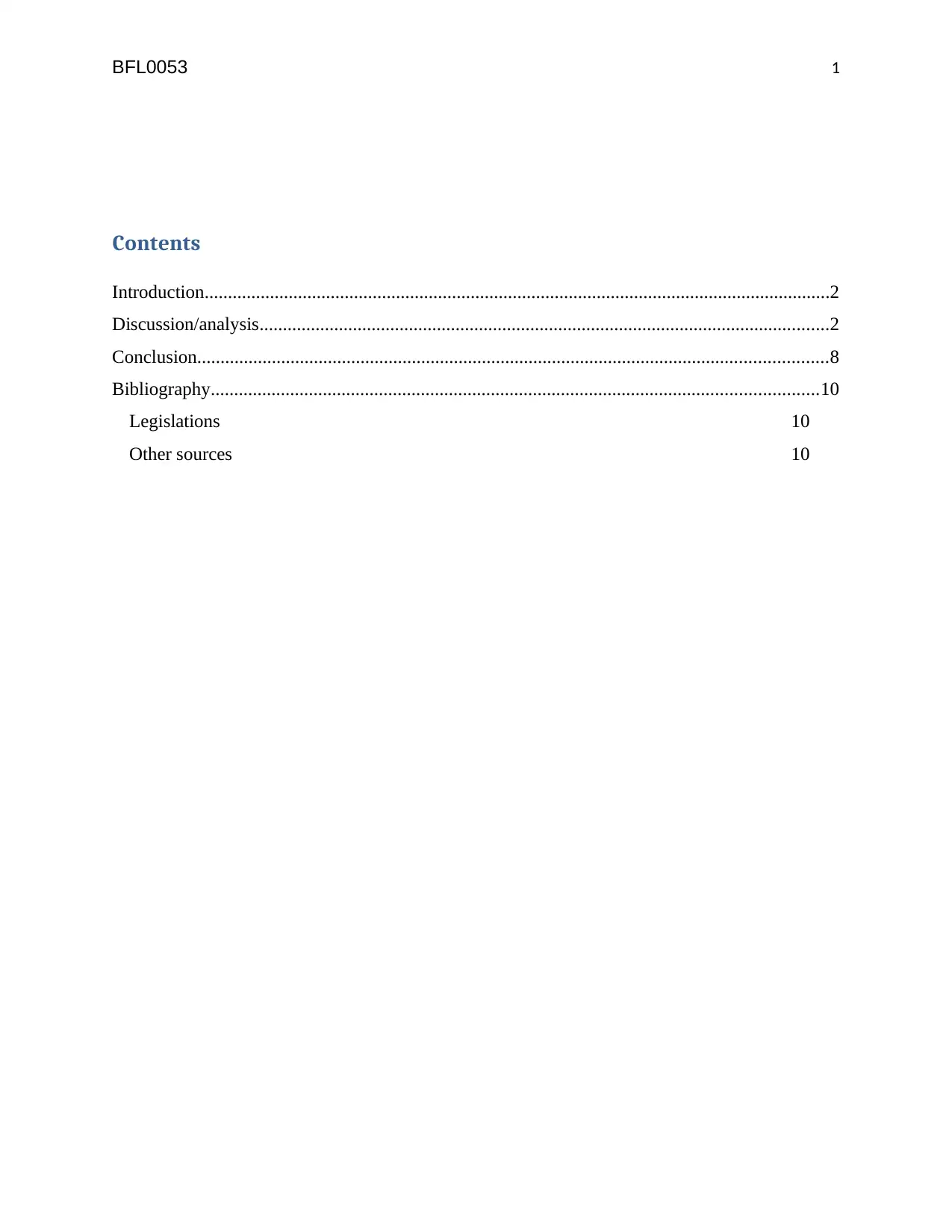
BFL0053 1
Contents
Introduction......................................................................................................................................2
Discussion/analysis..........................................................................................................................2
Conclusion.......................................................................................................................................8
Bibliography..................................................................................................................................10
Legislations 10
Other sources 10
Contents
Introduction......................................................................................................................................2
Discussion/analysis..........................................................................................................................2
Conclusion.......................................................................................................................................8
Bibliography..................................................................................................................................10
Legislations 10
Other sources 10
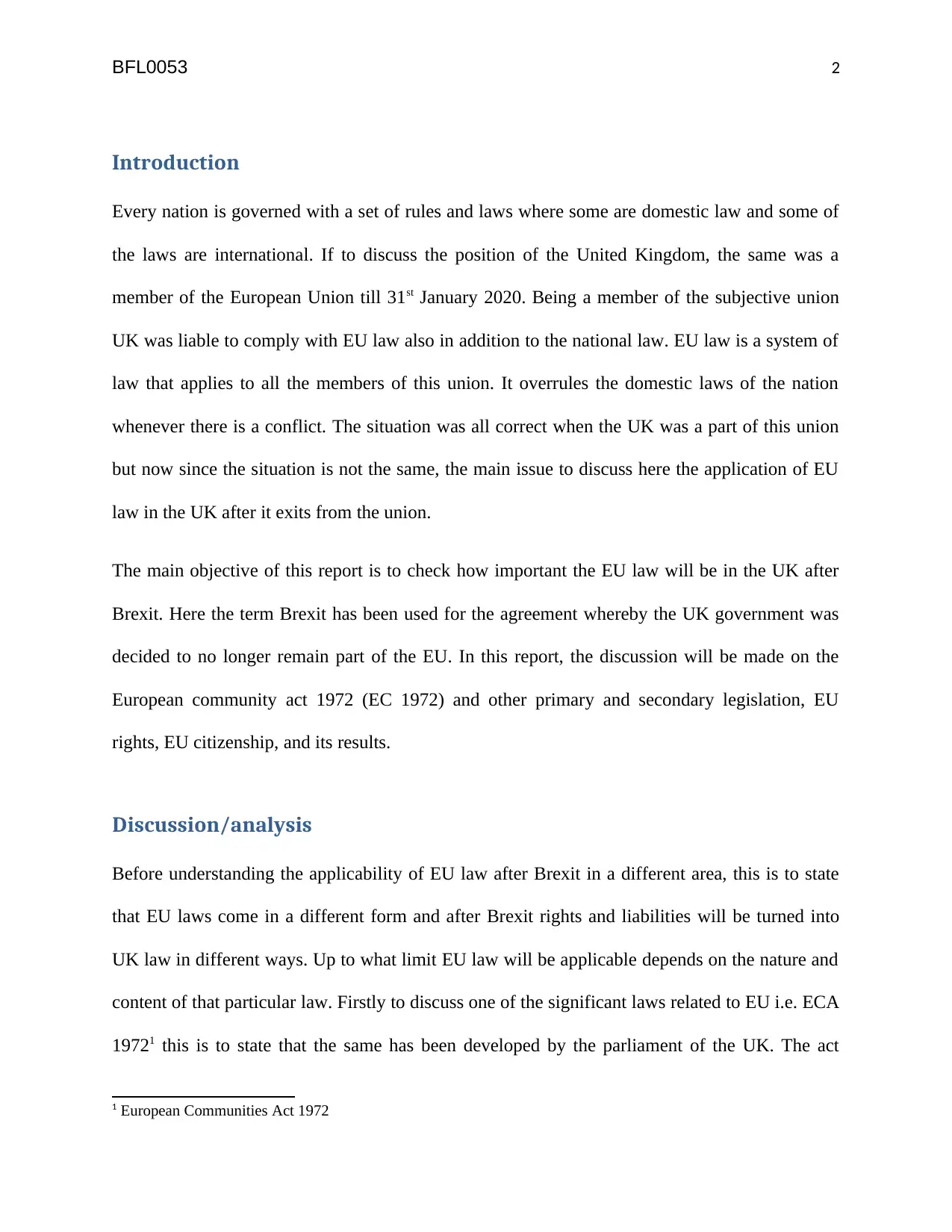
BFL0053 2
Introduction
Every nation is governed with a set of rules and laws where some are domestic law and some of
the laws are international. If to discuss the position of the United Kingdom, the same was a
member of the European Union till 31st January 2020. Being a member of the subjective union
UK was liable to comply with EU law also in addition to the national law. EU law is a system of
law that applies to all the members of this union. It overrules the domestic laws of the nation
whenever there is a conflict. The situation was all correct when the UK was a part of this union
but now since the situation is not the same, the main issue to discuss here the application of EU
law in the UK after it exits from the union.
The main objective of this report is to check how important the EU law will be in the UK after
Brexit. Here the term Brexit has been used for the agreement whereby the UK government was
decided to no longer remain part of the EU. In this report, the discussion will be made on the
European community act 1972 (EC 1972) and other primary and secondary legislation, EU
rights, EU citizenship, and its results.
Discussion/analysis
Before understanding the applicability of EU law after Brexit in a different area, this is to state
that EU laws come in a different form and after Brexit rights and liabilities will be turned into
UK law in different ways. Up to what limit EU law will be applicable depends on the nature and
content of that particular law. Firstly to discuss one of the significant laws related to EU i.e. ECA
19721 this is to state that the same has been developed by the parliament of the UK. The act
1 European Communities Act 1972
Introduction
Every nation is governed with a set of rules and laws where some are domestic law and some of
the laws are international. If to discuss the position of the United Kingdom, the same was a
member of the European Union till 31st January 2020. Being a member of the subjective union
UK was liable to comply with EU law also in addition to the national law. EU law is a system of
law that applies to all the members of this union. It overrules the domestic laws of the nation
whenever there is a conflict. The situation was all correct when the UK was a part of this union
but now since the situation is not the same, the main issue to discuss here the application of EU
law in the UK after it exits from the union.
The main objective of this report is to check how important the EU law will be in the UK after
Brexit. Here the term Brexit has been used for the agreement whereby the UK government was
decided to no longer remain part of the EU. In this report, the discussion will be made on the
European community act 1972 (EC 1972) and other primary and secondary legislation, EU
rights, EU citizenship, and its results.
Discussion/analysis
Before understanding the applicability of EU law after Brexit in a different area, this is to state
that EU laws come in a different form and after Brexit rights and liabilities will be turned into
UK law in different ways. Up to what limit EU law will be applicable depends on the nature and
content of that particular law. Firstly to discuss one of the significant laws related to EU i.e. ECA
19721 this is to state that the same has been developed by the parliament of the UK. The act
1 European Communities Act 1972
⊘ This is a preview!⊘
Do you want full access?
Subscribe today to unlock all pages.

Trusted by 1+ million students worldwide
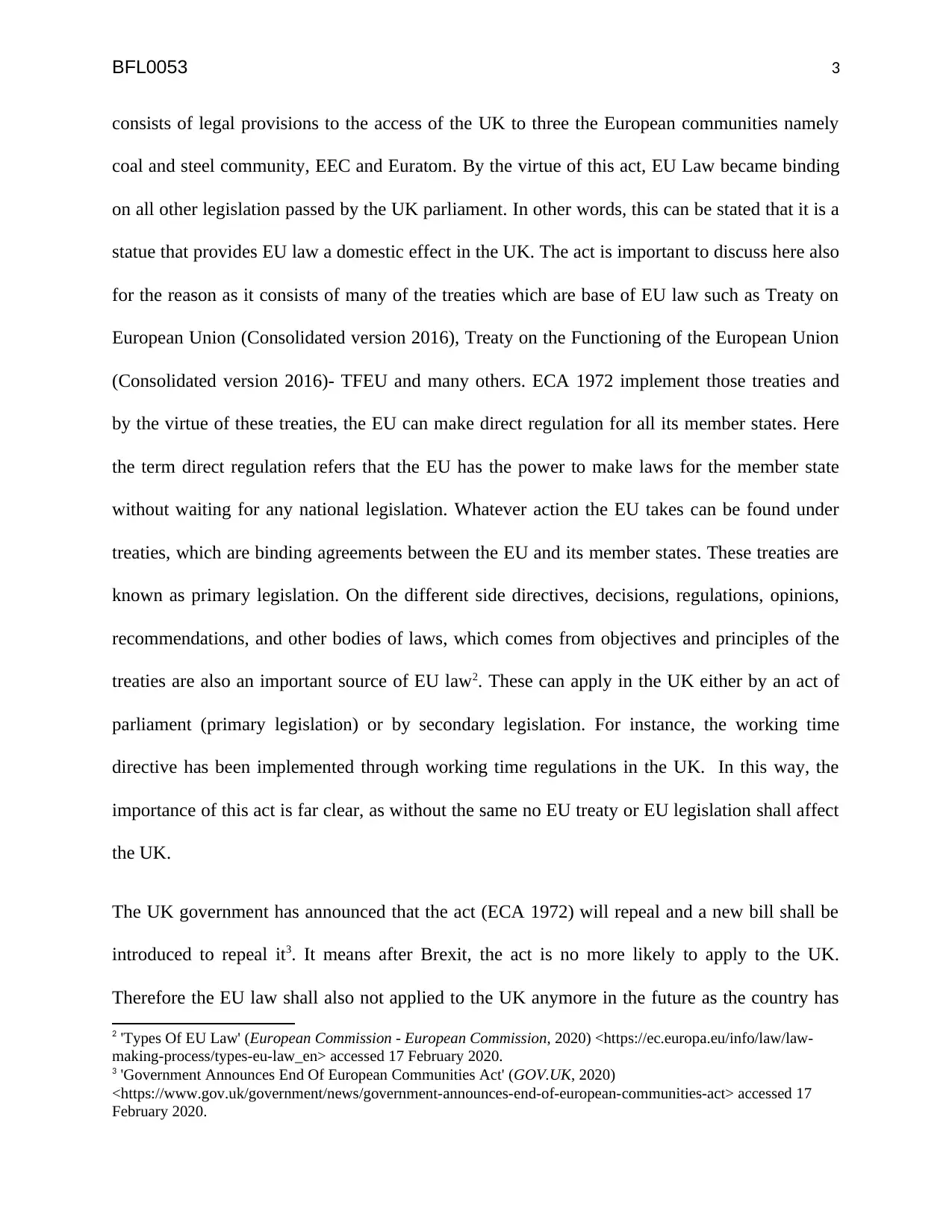
BFL0053 3
consists of legal provisions to the access of the UK to three the European communities namely
coal and steel community, EEC and Euratom. By the virtue of this act, EU Law became binding
on all other legislation passed by the UK parliament. In other words, this can be stated that it is a
statue that provides EU law a domestic effect in the UK. The act is important to discuss here also
for the reason as it consists of many of the treaties which are base of EU law such as Treaty on
European Union (Consolidated version 2016), Treaty on the Functioning of the European Union
(Consolidated version 2016)- TFEU and many others. ECA 1972 implement those treaties and
by the virtue of these treaties, the EU can make direct regulation for all its member states. Here
the term direct regulation refers that the EU has the power to make laws for the member state
without waiting for any national legislation. Whatever action the EU takes can be found under
treaties, which are binding agreements between the EU and its member states. These treaties are
known as primary legislation. On the different side directives, decisions, regulations, opinions,
recommendations, and other bodies of laws, which comes from objectives and principles of the
treaties are also an important source of EU law2. These can apply in the UK either by an act of
parliament (primary legislation) or by secondary legislation. For instance, the working time
directive has been implemented through working time regulations in the UK. In this way, the
importance of this act is far clear, as without the same no EU treaty or EU legislation shall affect
the UK.
The UK government has announced that the act (ECA 1972) will repeal and a new bill shall be
introduced to repeal it3. It means after Brexit, the act is no more likely to apply to the UK.
Therefore the EU law shall also not applied to the UK anymore in the future as the country has
2 'Types Of EU Law' (European Commission - European Commission, 2020) <https://ec.europa.eu/info/law/law-
making-process/types-eu-law_en> accessed 17 February 2020.
3 'Government Announces End Of European Communities Act' (GOV.UK, 2020)
<https://www.gov.uk/government/news/government-announces-end-of-european-communities-act> accessed 17
February 2020.
consists of legal provisions to the access of the UK to three the European communities namely
coal and steel community, EEC and Euratom. By the virtue of this act, EU Law became binding
on all other legislation passed by the UK parliament. In other words, this can be stated that it is a
statue that provides EU law a domestic effect in the UK. The act is important to discuss here also
for the reason as it consists of many of the treaties which are base of EU law such as Treaty on
European Union (Consolidated version 2016), Treaty on the Functioning of the European Union
(Consolidated version 2016)- TFEU and many others. ECA 1972 implement those treaties and
by the virtue of these treaties, the EU can make direct regulation for all its member states. Here
the term direct regulation refers that the EU has the power to make laws for the member state
without waiting for any national legislation. Whatever action the EU takes can be found under
treaties, which are binding agreements between the EU and its member states. These treaties are
known as primary legislation. On the different side directives, decisions, regulations, opinions,
recommendations, and other bodies of laws, which comes from objectives and principles of the
treaties are also an important source of EU law2. These can apply in the UK either by an act of
parliament (primary legislation) or by secondary legislation. For instance, the working time
directive has been implemented through working time regulations in the UK. In this way, the
importance of this act is far clear, as without the same no EU treaty or EU legislation shall affect
the UK.
The UK government has announced that the act (ECA 1972) will repeal and a new bill shall be
introduced to repeal it3. It means after Brexit, the act is no more likely to apply to the UK.
Therefore the EU law shall also not applied to the UK anymore in the future as the country has
2 'Types Of EU Law' (European Commission - European Commission, 2020) <https://ec.europa.eu/info/law/law-
making-process/types-eu-law_en> accessed 17 February 2020.
3 'Government Announces End Of European Communities Act' (GOV.UK, 2020)
<https://www.gov.uk/government/news/government-announces-end-of-european-communities-act> accessed 17
February 2020.
Paraphrase This Document
Need a fresh take? Get an instant paraphrase of this document with our AI Paraphraser
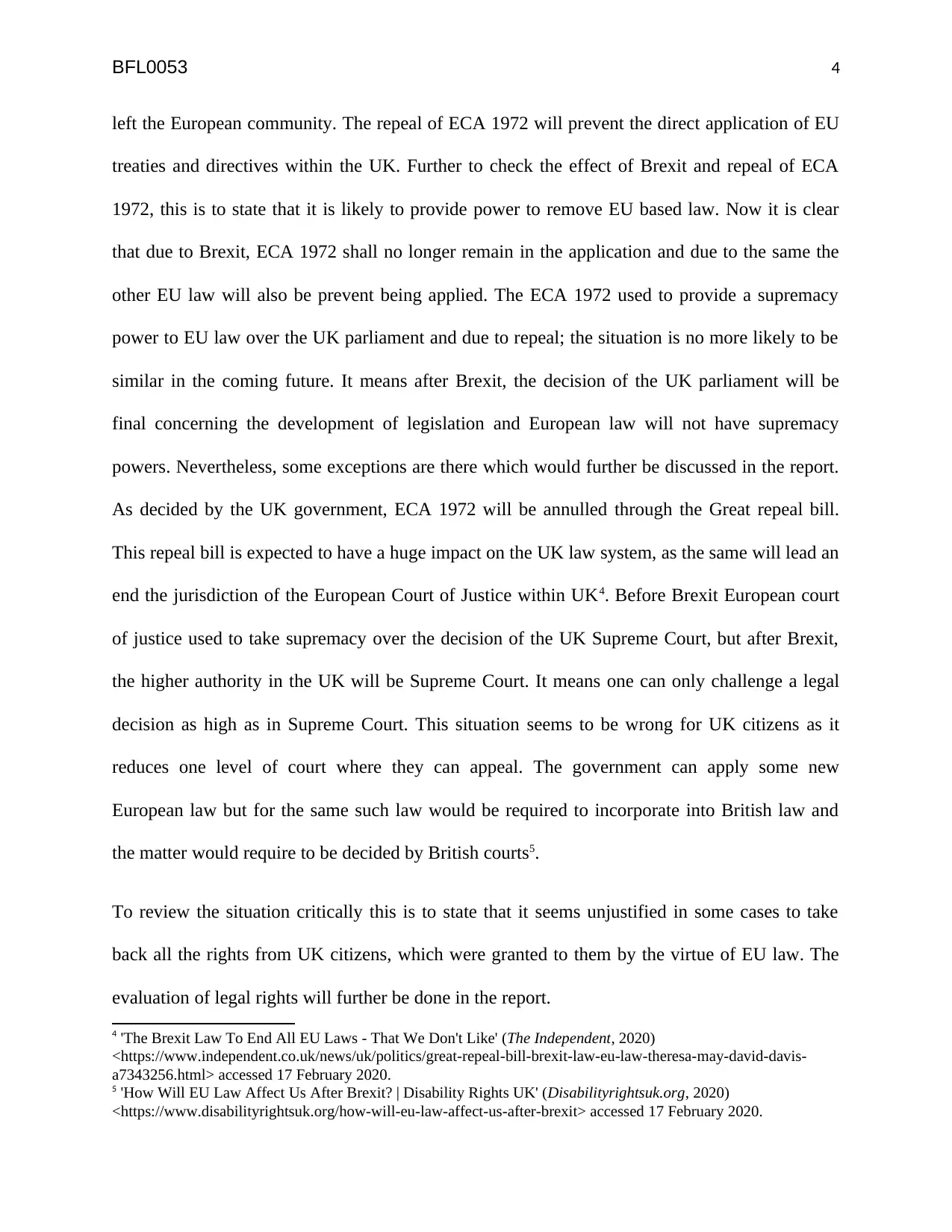
BFL0053 4
left the European community. The repeal of ECA 1972 will prevent the direct application of EU
treaties and directives within the UK. Further to check the effect of Brexit and repeal of ECA
1972, this is to state that it is likely to provide power to remove EU based law. Now it is clear
that due to Brexit, ECA 1972 shall no longer remain in the application and due to the same the
other EU law will also be prevent being applied. The ECA 1972 used to provide a supremacy
power to EU law over the UK parliament and due to repeal; the situation is no more likely to be
similar in the coming future. It means after Brexit, the decision of the UK parliament will be
final concerning the development of legislation and European law will not have supremacy
powers. Nevertheless, some exceptions are there which would further be discussed in the report.
As decided by the UK government, ECA 1972 will be annulled through the Great repeal bill.
This repeal bill is expected to have a huge impact on the UK law system, as the same will lead an
end the jurisdiction of the European Court of Justice within UK4. Before Brexit European court
of justice used to take supremacy over the decision of the UK Supreme Court, but after Brexit,
the higher authority in the UK will be Supreme Court. It means one can only challenge a legal
decision as high as in Supreme Court. This situation seems to be wrong for UK citizens as it
reduces one level of court where they can appeal. The government can apply some new
European law but for the same such law would be required to incorporate into British law and
the matter would require to be decided by British courts5.
To review the situation critically this is to state that it seems unjustified in some cases to take
back all the rights from UK citizens, which were granted to them by the virtue of EU law. The
evaluation of legal rights will further be done in the report.
4 'The Brexit Law To End All EU Laws - That We Don't Like' (The Independent, 2020)
<https://www.independent.co.uk/news/uk/politics/great-repeal-bill-brexit-law-eu-law-theresa-may-david-davis-
a7343256.html> accessed 17 February 2020.
5 'How Will EU Law Affect Us After Brexit? | Disability Rights UK' (Disabilityrightsuk.org, 2020)
<https://www.disabilityrightsuk.org/how-will-eu-law-affect-us-after-brexit> accessed 17 February 2020.
left the European community. The repeal of ECA 1972 will prevent the direct application of EU
treaties and directives within the UK. Further to check the effect of Brexit and repeal of ECA
1972, this is to state that it is likely to provide power to remove EU based law. Now it is clear
that due to Brexit, ECA 1972 shall no longer remain in the application and due to the same the
other EU law will also be prevent being applied. The ECA 1972 used to provide a supremacy
power to EU law over the UK parliament and due to repeal; the situation is no more likely to be
similar in the coming future. It means after Brexit, the decision of the UK parliament will be
final concerning the development of legislation and European law will not have supremacy
powers. Nevertheless, some exceptions are there which would further be discussed in the report.
As decided by the UK government, ECA 1972 will be annulled through the Great repeal bill.
This repeal bill is expected to have a huge impact on the UK law system, as the same will lead an
end the jurisdiction of the European Court of Justice within UK4. Before Brexit European court
of justice used to take supremacy over the decision of the UK Supreme Court, but after Brexit,
the higher authority in the UK will be Supreme Court. It means one can only challenge a legal
decision as high as in Supreme Court. This situation seems to be wrong for UK citizens as it
reduces one level of court where they can appeal. The government can apply some new
European law but for the same such law would be required to incorporate into British law and
the matter would require to be decided by British courts5.
To review the situation critically this is to state that it seems unjustified in some cases to take
back all the rights from UK citizens, which were granted to them by the virtue of EU law. The
evaluation of legal rights will further be done in the report.
4 'The Brexit Law To End All EU Laws - That We Don't Like' (The Independent, 2020)
<https://www.independent.co.uk/news/uk/politics/great-repeal-bill-brexit-law-eu-law-theresa-may-david-davis-
a7343256.html> accessed 17 February 2020.
5 'How Will EU Law Affect Us After Brexit? | Disability Rights UK' (Disabilityrightsuk.org, 2020)
<https://www.disabilityrightsuk.org/how-will-eu-law-affect-us-after-brexit> accessed 17 February 2020.
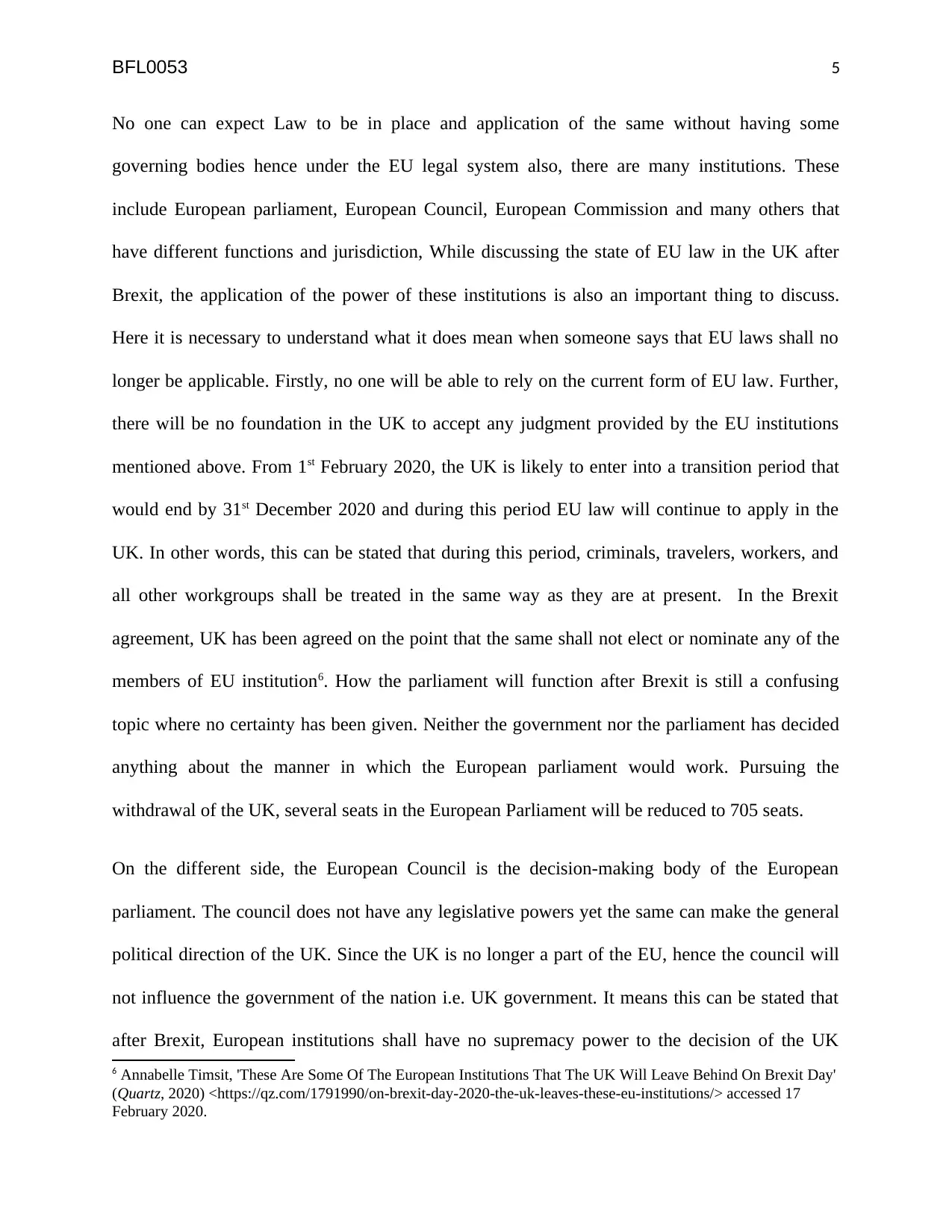
BFL0053 5
No one can expect Law to be in place and application of the same without having some
governing bodies hence under the EU legal system also, there are many institutions. These
include European parliament, European Council, European Commission and many others that
have different functions and jurisdiction, While discussing the state of EU law in the UK after
Brexit, the application of the power of these institutions is also an important thing to discuss.
Here it is necessary to understand what it does mean when someone says that EU laws shall no
longer be applicable. Firstly, no one will be able to rely on the current form of EU law. Further,
there will be no foundation in the UK to accept any judgment provided by the EU institutions
mentioned above. From 1st February 2020, the UK is likely to enter into a transition period that
would end by 31st December 2020 and during this period EU law will continue to apply in the
UK. In other words, this can be stated that during this period, criminals, travelers, workers, and
all other workgroups shall be treated in the same way as they are at present. In the Brexit
agreement, UK has been agreed on the point that the same shall not elect or nominate any of the
members of EU institution6. How the parliament will function after Brexit is still a confusing
topic where no certainty has been given. Neither the government nor the parliament has decided
anything about the manner in which the European parliament would work. Pursuing the
withdrawal of the UK, several seats in the European Parliament will be reduced to 705 seats.
On the different side, the European Council is the decision-making body of the European
parliament. The council does not have any legislative powers yet the same can make the general
political direction of the UK. Since the UK is no longer a part of the EU, hence the council will
not influence the government of the nation i.e. UK government. It means this can be stated that
after Brexit, European institutions shall have no supremacy power to the decision of the UK
6 Annabelle Timsit, 'These Are Some Of The European Institutions That The UK Will Leave Behind On Brexit Day'
(Quartz, 2020) <https://qz.com/1791990/on-brexit-day-2020-the-uk-leaves-these-eu-institutions/> accessed 17
February 2020.
No one can expect Law to be in place and application of the same without having some
governing bodies hence under the EU legal system also, there are many institutions. These
include European parliament, European Council, European Commission and many others that
have different functions and jurisdiction, While discussing the state of EU law in the UK after
Brexit, the application of the power of these institutions is also an important thing to discuss.
Here it is necessary to understand what it does mean when someone says that EU laws shall no
longer be applicable. Firstly, no one will be able to rely on the current form of EU law. Further,
there will be no foundation in the UK to accept any judgment provided by the EU institutions
mentioned above. From 1st February 2020, the UK is likely to enter into a transition period that
would end by 31st December 2020 and during this period EU law will continue to apply in the
UK. In other words, this can be stated that during this period, criminals, travelers, workers, and
all other workgroups shall be treated in the same way as they are at present. In the Brexit
agreement, UK has been agreed on the point that the same shall not elect or nominate any of the
members of EU institution6. How the parliament will function after Brexit is still a confusing
topic where no certainty has been given. Neither the government nor the parliament has decided
anything about the manner in which the European parliament would work. Pursuing the
withdrawal of the UK, several seats in the European Parliament will be reduced to 705 seats.
On the different side, the European Council is the decision-making body of the European
parliament. The council does not have any legislative powers yet the same can make the general
political direction of the UK. Since the UK is no longer a part of the EU, hence the council will
not influence the government of the nation i.e. UK government. It means this can be stated that
after Brexit, European institutions shall have no supremacy power to the decision of the UK
6 Annabelle Timsit, 'These Are Some Of The European Institutions That The UK Will Leave Behind On Brexit Day'
(Quartz, 2020) <https://qz.com/1791990/on-brexit-day-2020-the-uk-leaves-these-eu-institutions/> accessed 17
February 2020.
⊘ This is a preview!⊘
Do you want full access?
Subscribe today to unlock all pages.

Trusted by 1+ million students worldwide
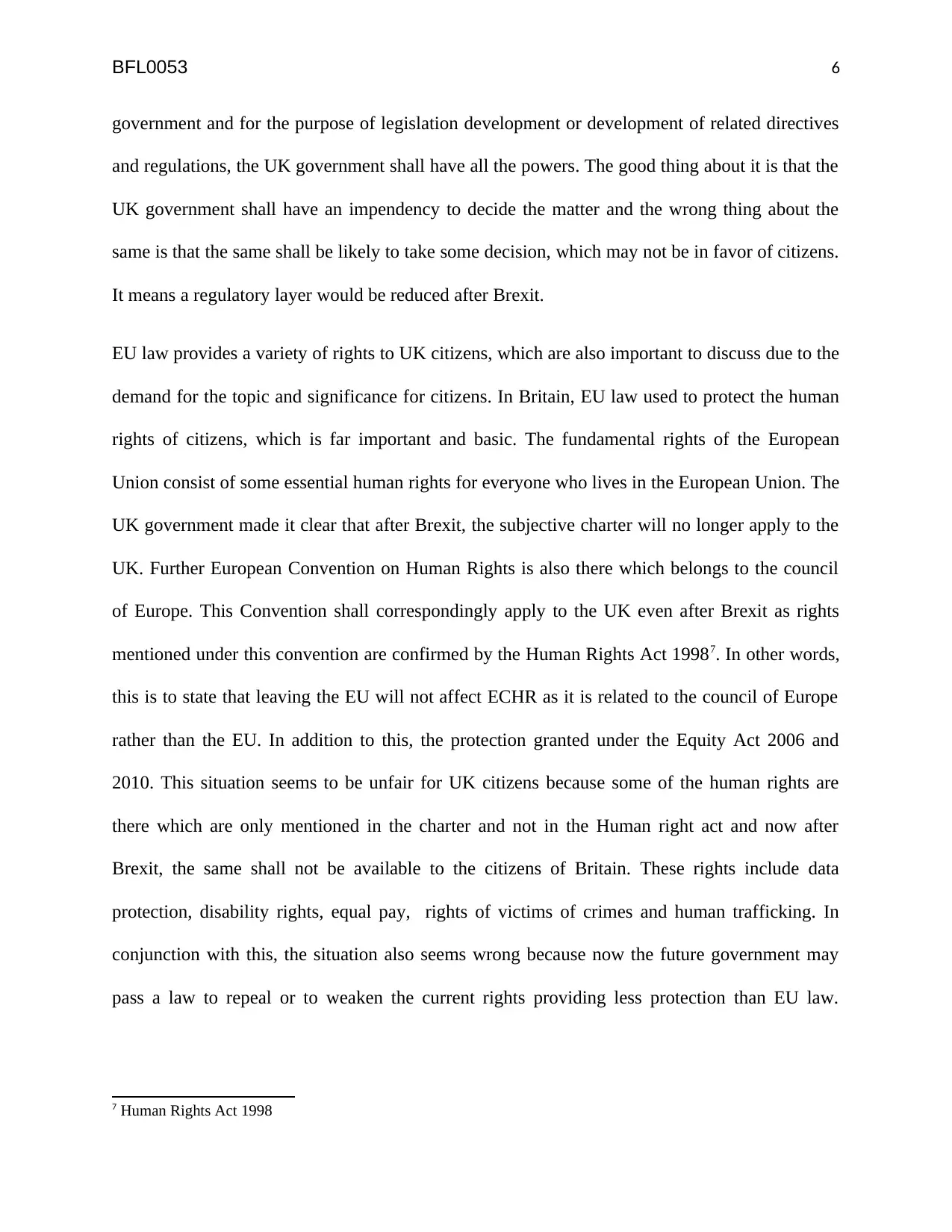
BFL0053 6
government and for the purpose of legislation development or development of related directives
and regulations, the UK government shall have all the powers. The good thing about it is that the
UK government shall have an impendency to decide the matter and the wrong thing about the
same is that the same shall be likely to take some decision, which may not be in favor of citizens.
It means a regulatory layer would be reduced after Brexit.
EU law provides a variety of rights to UK citizens, which are also important to discuss due to the
demand for the topic and significance for citizens. In Britain, EU law used to protect the human
rights of citizens, which is far important and basic. The fundamental rights of the European
Union consist of some essential human rights for everyone who lives in the European Union. The
UK government made it clear that after Brexit, the subjective charter will no longer apply to the
UK. Further European Convention on Human Rights is also there which belongs to the council
of Europe. This Convention shall correspondingly apply to the UK even after Brexit as rights
mentioned under this convention are confirmed by the Human Rights Act 19987. In other words,
this is to state that leaving the EU will not affect ECHR as it is related to the council of Europe
rather than the EU. In addition to this, the protection granted under the Equity Act 2006 and
2010. This situation seems to be unfair for UK citizens because some of the human rights are
there which are only mentioned in the charter and not in the Human right act and now after
Brexit, the same shall not be available to the citizens of Britain. These rights include data
protection, disability rights, equal pay, rights of victims of crimes and human trafficking. In
conjunction with this, the situation also seems wrong because now the future government may
pass a law to repeal or to weaken the current rights providing less protection than EU law.
7 Human Rights Act 1998
government and for the purpose of legislation development or development of related directives
and regulations, the UK government shall have all the powers. The good thing about it is that the
UK government shall have an impendency to decide the matter and the wrong thing about the
same is that the same shall be likely to take some decision, which may not be in favor of citizens.
It means a regulatory layer would be reduced after Brexit.
EU law provides a variety of rights to UK citizens, which are also important to discuss due to the
demand for the topic and significance for citizens. In Britain, EU law used to protect the human
rights of citizens, which is far important and basic. The fundamental rights of the European
Union consist of some essential human rights for everyone who lives in the European Union. The
UK government made it clear that after Brexit, the subjective charter will no longer apply to the
UK. Further European Convention on Human Rights is also there which belongs to the council
of Europe. This Convention shall correspondingly apply to the UK even after Brexit as rights
mentioned under this convention are confirmed by the Human Rights Act 19987. In other words,
this is to state that leaving the EU will not affect ECHR as it is related to the council of Europe
rather than the EU. In addition to this, the protection granted under the Equity Act 2006 and
2010. This situation seems to be unfair for UK citizens because some of the human rights are
there which are only mentioned in the charter and not in the Human right act and now after
Brexit, the same shall not be available to the citizens of Britain. These rights include data
protection, disability rights, equal pay, rights of victims of crimes and human trafficking. In
conjunction with this, the situation also seems wrong because now the future government may
pass a law to repeal or to weaken the current rights providing less protection than EU law.
7 Human Rights Act 1998
Paraphrase This Document
Need a fresh take? Get an instant paraphrase of this document with our AI Paraphraser
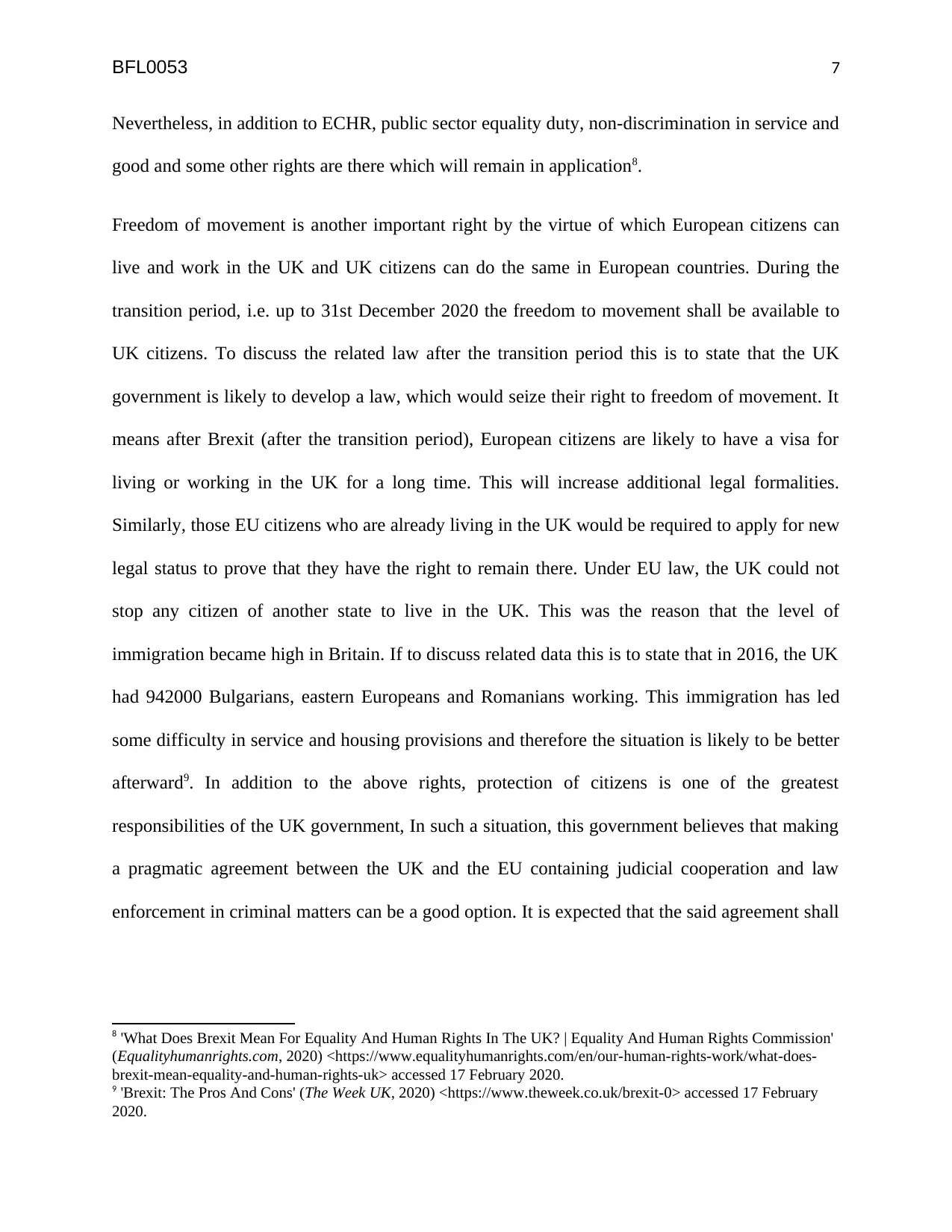
BFL0053 7
Nevertheless, in addition to ECHR, public sector equality duty, non-discrimination in service and
good and some other rights are there which will remain in application8.
Freedom of movement is another important right by the virtue of which European citizens can
live and work in the UK and UK citizens can do the same in European countries. During the
transition period, i.e. up to 31st December 2020 the freedom to movement shall be available to
UK citizens. To discuss the related law after the transition period this is to state that the UK
government is likely to develop a law, which would seize their right to freedom of movement. It
means after Brexit (after the transition period), European citizens are likely to have a visa for
living or working in the UK for a long time. This will increase additional legal formalities.
Similarly, those EU citizens who are already living in the UK would be required to apply for new
legal status to prove that they have the right to remain there. Under EU law, the UK could not
stop any citizen of another state to live in the UK. This was the reason that the level of
immigration became high in Britain. If to discuss related data this is to state that in 2016, the UK
had 942000 Bulgarians, eastern Europeans and Romanians working. This immigration has led
some difficulty in service and housing provisions and therefore the situation is likely to be better
afterward9. In addition to the above rights, protection of citizens is one of the greatest
responsibilities of the UK government, In such a situation, this government believes that making
a pragmatic agreement between the UK and the EU containing judicial cooperation and law
enforcement in criminal matters can be a good option. It is expected that the said agreement shall
8 'What Does Brexit Mean For Equality And Human Rights In The UK? | Equality And Human Rights Commission'
(Equalityhumanrights.com, 2020) <https://www.equalityhumanrights.com/en/our-human-rights-work/what-does-
brexit-mean-equality-and-human-rights-uk> accessed 17 February 2020.
9 'Brexit: The Pros And Cons' (The Week UK, 2020) <https://www.theweek.co.uk/brexit-0> accessed 17 February
2020.
Nevertheless, in addition to ECHR, public sector equality duty, non-discrimination in service and
good and some other rights are there which will remain in application8.
Freedom of movement is another important right by the virtue of which European citizens can
live and work in the UK and UK citizens can do the same in European countries. During the
transition period, i.e. up to 31st December 2020 the freedom to movement shall be available to
UK citizens. To discuss the related law after the transition period this is to state that the UK
government is likely to develop a law, which would seize their right to freedom of movement. It
means after Brexit (after the transition period), European citizens are likely to have a visa for
living or working in the UK for a long time. This will increase additional legal formalities.
Similarly, those EU citizens who are already living in the UK would be required to apply for new
legal status to prove that they have the right to remain there. Under EU law, the UK could not
stop any citizen of another state to live in the UK. This was the reason that the level of
immigration became high in Britain. If to discuss related data this is to state that in 2016, the UK
had 942000 Bulgarians, eastern Europeans and Romanians working. This immigration has led
some difficulty in service and housing provisions and therefore the situation is likely to be better
afterward9. In addition to the above rights, protection of citizens is one of the greatest
responsibilities of the UK government, In such a situation, this government believes that making
a pragmatic agreement between the UK and the EU containing judicial cooperation and law
enforcement in criminal matters can be a good option. It is expected that the said agreement shall
8 'What Does Brexit Mean For Equality And Human Rights In The UK? | Equality And Human Rights Commission'
(Equalityhumanrights.com, 2020) <https://www.equalityhumanrights.com/en/our-human-rights-work/what-does-
brexit-mean-equality-and-human-rights-uk> accessed 17 February 2020.
9 'Brexit: The Pros And Cons' (The Week UK, 2020) <https://www.theweek.co.uk/brexit-0> accessed 17 February
2020.
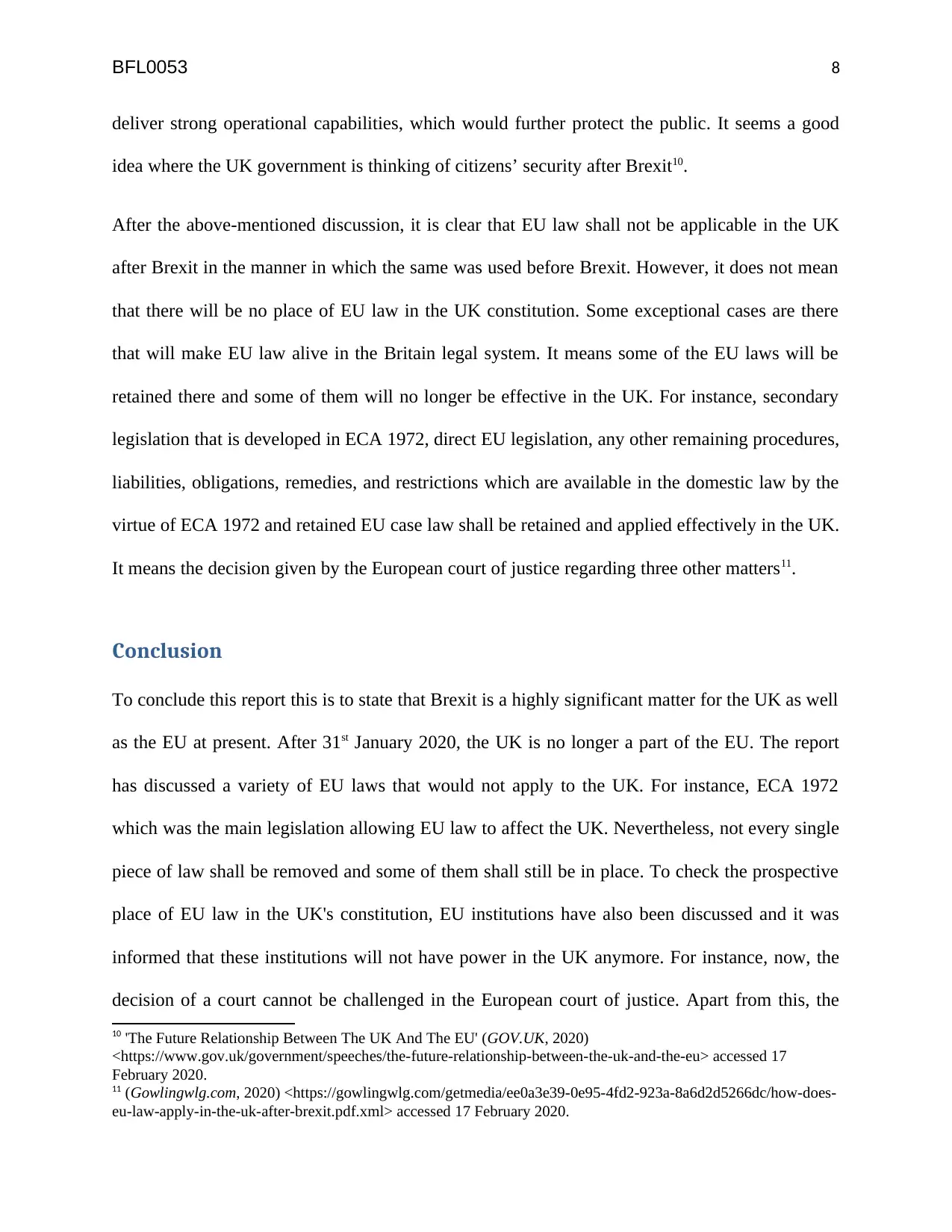
BFL0053 8
deliver strong operational capabilities, which would further protect the public. It seems a good
idea where the UK government is thinking of citizens’ security after Brexit10.
After the above-mentioned discussion, it is clear that EU law shall not be applicable in the UK
after Brexit in the manner in which the same was used before Brexit. However, it does not mean
that there will be no place of EU law in the UK constitution. Some exceptional cases are there
that will make EU law alive in the Britain legal system. It means some of the EU laws will be
retained there and some of them will no longer be effective in the UK. For instance, secondary
legislation that is developed in ECA 1972, direct EU legislation, any other remaining procedures,
liabilities, obligations, remedies, and restrictions which are available in the domestic law by the
virtue of ECA 1972 and retained EU case law shall be retained and applied effectively in the UK.
It means the decision given by the European court of justice regarding three other matters11.
Conclusion
To conclude this report this is to state that Brexit is a highly significant matter for the UK as well
as the EU at present. After 31st January 2020, the UK is no longer a part of the EU. The report
has discussed a variety of EU laws that would not apply to the UK. For instance, ECA 1972
which was the main legislation allowing EU law to affect the UK. Nevertheless, not every single
piece of law shall be removed and some of them shall still be in place. To check the prospective
place of EU law in the UK's constitution, EU institutions have also been discussed and it was
informed that these institutions will not have power in the UK anymore. For instance, now, the
decision of a court cannot be challenged in the European court of justice. Apart from this, the
10 'The Future Relationship Between The UK And The EU' (GOV.UK, 2020)
<https://www.gov.uk/government/speeches/the-future-relationship-between-the-uk-and-the-eu> accessed 17
February 2020.
11 (Gowlingwlg.com, 2020) <https://gowlingwlg.com/getmedia/ee0a3e39-0e95-4fd2-923a-8a6d2d5266dc/how-does-
eu-law-apply-in-the-uk-after-brexit.pdf.xml> accessed 17 February 2020.
deliver strong operational capabilities, which would further protect the public. It seems a good
idea where the UK government is thinking of citizens’ security after Brexit10.
After the above-mentioned discussion, it is clear that EU law shall not be applicable in the UK
after Brexit in the manner in which the same was used before Brexit. However, it does not mean
that there will be no place of EU law in the UK constitution. Some exceptional cases are there
that will make EU law alive in the Britain legal system. It means some of the EU laws will be
retained there and some of them will no longer be effective in the UK. For instance, secondary
legislation that is developed in ECA 1972, direct EU legislation, any other remaining procedures,
liabilities, obligations, remedies, and restrictions which are available in the domestic law by the
virtue of ECA 1972 and retained EU case law shall be retained and applied effectively in the UK.
It means the decision given by the European court of justice regarding three other matters11.
Conclusion
To conclude this report this is to state that Brexit is a highly significant matter for the UK as well
as the EU at present. After 31st January 2020, the UK is no longer a part of the EU. The report
has discussed a variety of EU laws that would not apply to the UK. For instance, ECA 1972
which was the main legislation allowing EU law to affect the UK. Nevertheless, not every single
piece of law shall be removed and some of them shall still be in place. To check the prospective
place of EU law in the UK's constitution, EU institutions have also been discussed and it was
informed that these institutions will not have power in the UK anymore. For instance, now, the
decision of a court cannot be challenged in the European court of justice. Apart from this, the
10 'The Future Relationship Between The UK And The EU' (GOV.UK, 2020)
<https://www.gov.uk/government/speeches/the-future-relationship-between-the-uk-and-the-eu> accessed 17
February 2020.
11 (Gowlingwlg.com, 2020) <https://gowlingwlg.com/getmedia/ee0a3e39-0e95-4fd2-923a-8a6d2d5266dc/how-does-
eu-law-apply-in-the-uk-after-brexit.pdf.xml> accessed 17 February 2020.
⊘ This is a preview!⊘
Do you want full access?
Subscribe today to unlock all pages.

Trusted by 1+ million students worldwide
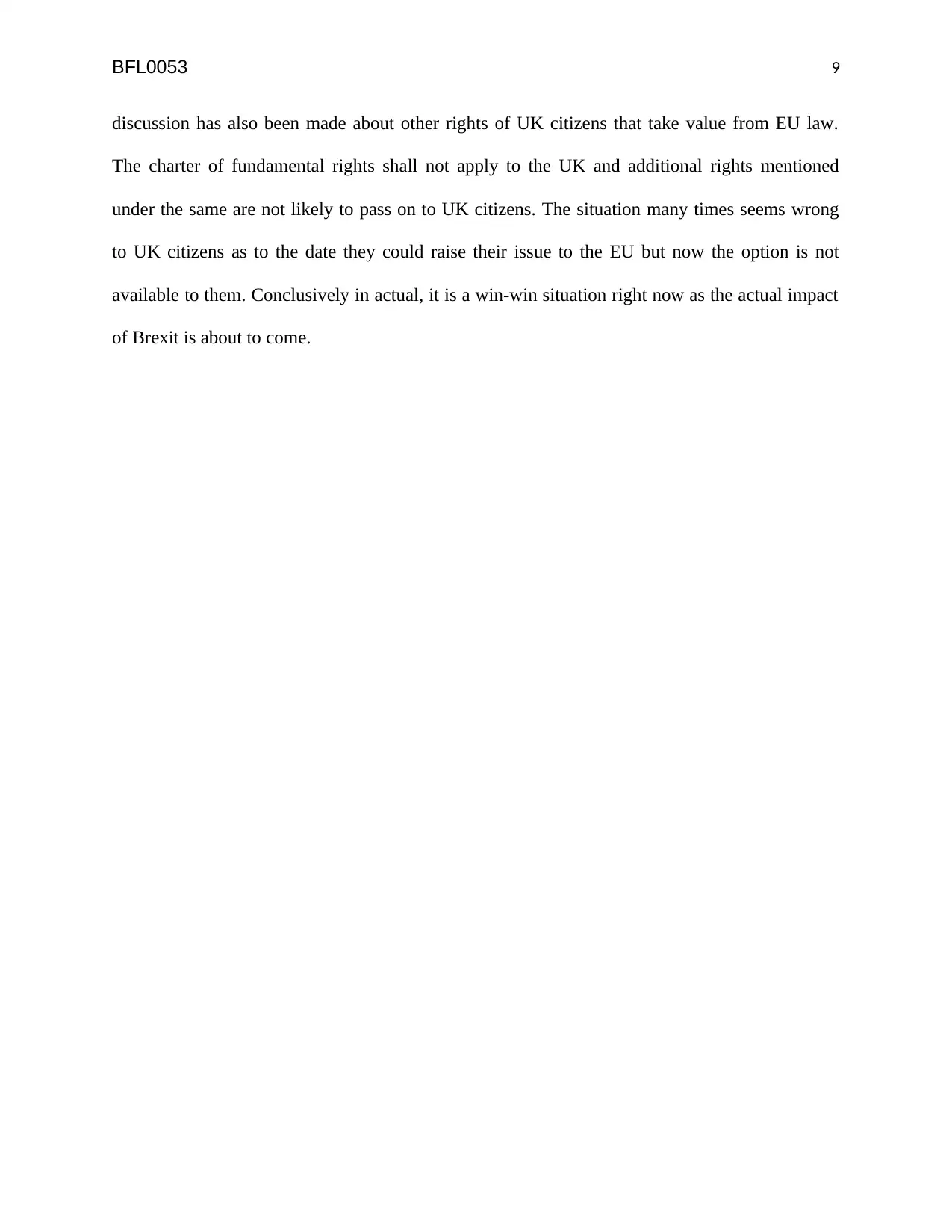
BFL0053 9
discussion has also been made about other rights of UK citizens that take value from EU law.
The charter of fundamental rights shall not apply to the UK and additional rights mentioned
under the same are not likely to pass on to UK citizens. The situation many times seems wrong
to UK citizens as to the date they could raise their issue to the EU but now the option is not
available to them. Conclusively in actual, it is a win-win situation right now as the actual impact
of Brexit is about to come.
discussion has also been made about other rights of UK citizens that take value from EU law.
The charter of fundamental rights shall not apply to the UK and additional rights mentioned
under the same are not likely to pass on to UK citizens. The situation many times seems wrong
to UK citizens as to the date they could raise their issue to the EU but now the option is not
available to them. Conclusively in actual, it is a win-win situation right now as the actual impact
of Brexit is about to come.
Paraphrase This Document
Need a fresh take? Get an instant paraphrase of this document with our AI Paraphraser
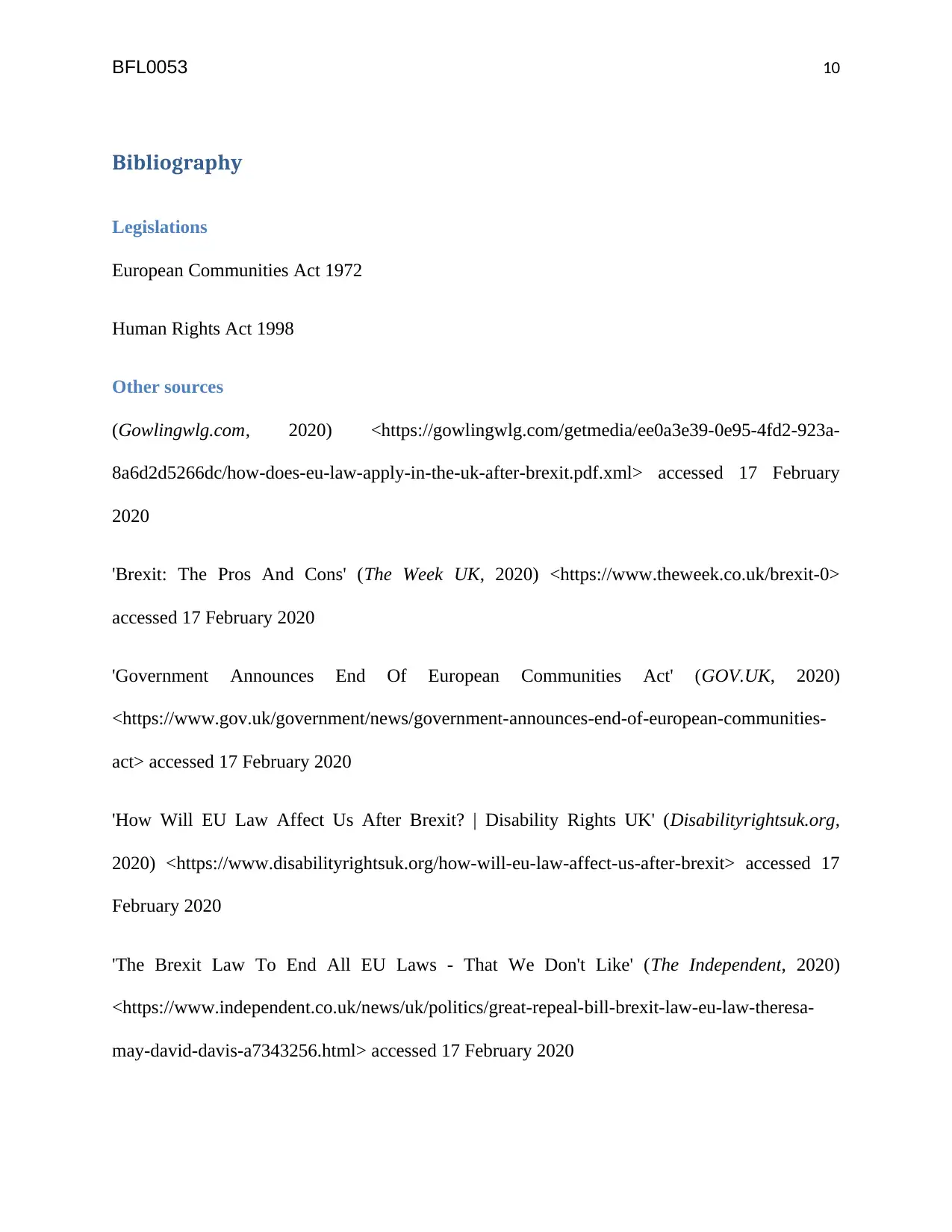
BFL0053 10
Bibliography
Legislations
European Communities Act 1972
Human Rights Act 1998
Other sources
(Gowlingwlg.com, 2020) <https://gowlingwlg.com/getmedia/ee0a3e39-0e95-4fd2-923a-
8a6d2d5266dc/how-does-eu-law-apply-in-the-uk-after-brexit.pdf.xml> accessed 17 February
2020
'Brexit: The Pros And Cons' (The Week UK, 2020) <https://www.theweek.co.uk/brexit-0>
accessed 17 February 2020
'Government Announces End Of European Communities Act' (GOV.UK, 2020)
<https://www.gov.uk/government/news/government-announces-end-of-european-communities-
act> accessed 17 February 2020
'How Will EU Law Affect Us After Brexit? | Disability Rights UK' (Disabilityrightsuk.org,
2020) <https://www.disabilityrightsuk.org/how-will-eu-law-affect-us-after-brexit> accessed 17
February 2020
'The Brexit Law To End All EU Laws - That We Don't Like' (The Independent, 2020)
<https://www.independent.co.uk/news/uk/politics/great-repeal-bill-brexit-law-eu-law-theresa-
may-david-davis-a7343256.html> accessed 17 February 2020
Bibliography
Legislations
European Communities Act 1972
Human Rights Act 1998
Other sources
(Gowlingwlg.com, 2020) <https://gowlingwlg.com/getmedia/ee0a3e39-0e95-4fd2-923a-
8a6d2d5266dc/how-does-eu-law-apply-in-the-uk-after-brexit.pdf.xml> accessed 17 February
2020
'Brexit: The Pros And Cons' (The Week UK, 2020) <https://www.theweek.co.uk/brexit-0>
accessed 17 February 2020
'Government Announces End Of European Communities Act' (GOV.UK, 2020)
<https://www.gov.uk/government/news/government-announces-end-of-european-communities-
act> accessed 17 February 2020
'How Will EU Law Affect Us After Brexit? | Disability Rights UK' (Disabilityrightsuk.org,
2020) <https://www.disabilityrightsuk.org/how-will-eu-law-affect-us-after-brexit> accessed 17
February 2020
'The Brexit Law To End All EU Laws - That We Don't Like' (The Independent, 2020)
<https://www.independent.co.uk/news/uk/politics/great-repeal-bill-brexit-law-eu-law-theresa-
may-david-davis-a7343256.html> accessed 17 February 2020
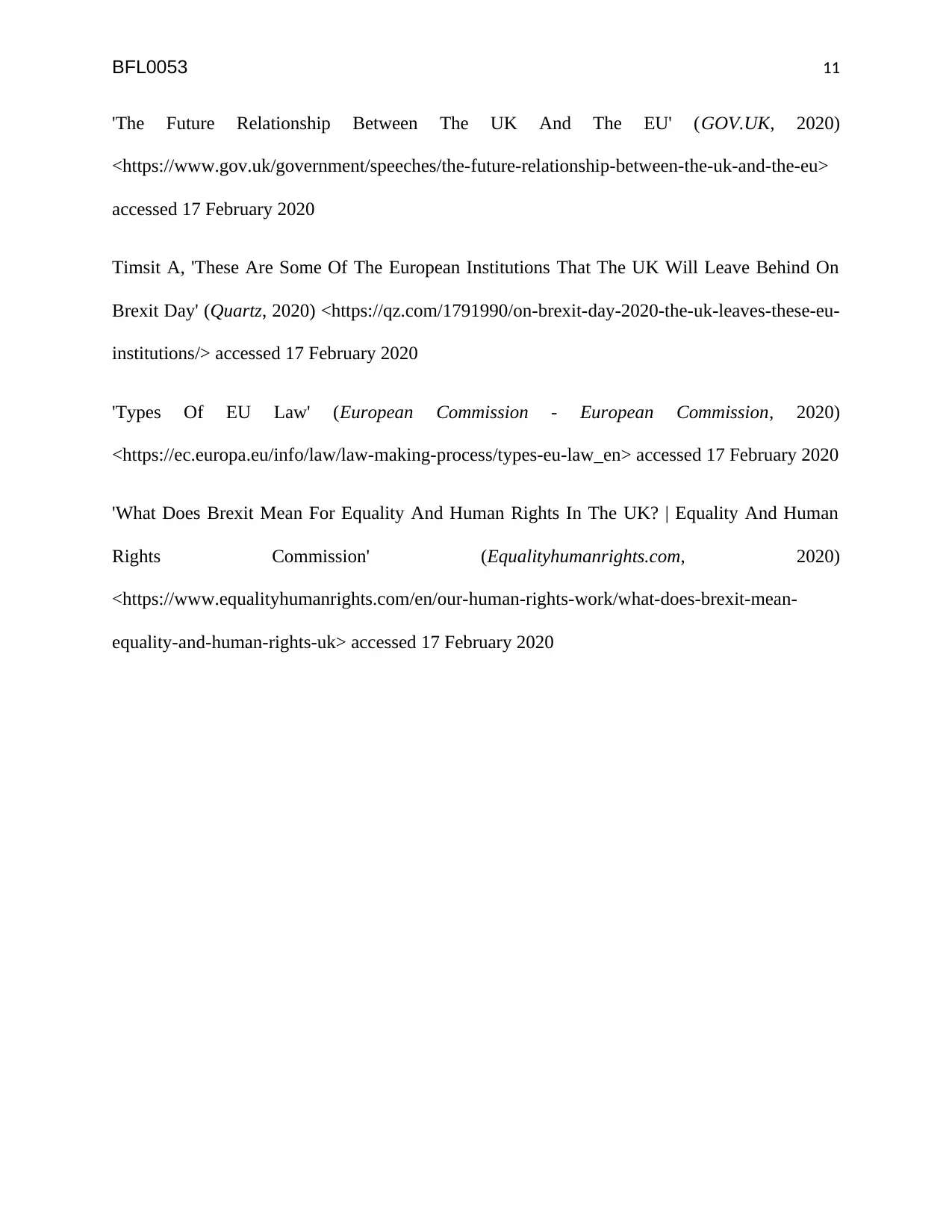
BFL0053 11
'The Future Relationship Between The UK And The EU' (GOV.UK, 2020)
<https://www.gov.uk/government/speeches/the-future-relationship-between-the-uk-and-the-eu>
accessed 17 February 2020
Timsit A, 'These Are Some Of The European Institutions That The UK Will Leave Behind On
Brexit Day' (Quartz, 2020) <https://qz.com/1791990/on-brexit-day-2020-the-uk-leaves-these-eu-
institutions/> accessed 17 February 2020
'Types Of EU Law' (European Commission - European Commission, 2020)
<https://ec.europa.eu/info/law/law-making-process/types-eu-law_en> accessed 17 February 2020
'What Does Brexit Mean For Equality And Human Rights In The UK? | Equality And Human
Rights Commission' (Equalityhumanrights.com, 2020)
<https://www.equalityhumanrights.com/en/our-human-rights-work/what-does-brexit-mean-
equality-and-human-rights-uk> accessed 17 February 2020
'The Future Relationship Between The UK And The EU' (GOV.UK, 2020)
<https://www.gov.uk/government/speeches/the-future-relationship-between-the-uk-and-the-eu>
accessed 17 February 2020
Timsit A, 'These Are Some Of The European Institutions That The UK Will Leave Behind On
Brexit Day' (Quartz, 2020) <https://qz.com/1791990/on-brexit-day-2020-the-uk-leaves-these-eu-
institutions/> accessed 17 February 2020
'Types Of EU Law' (European Commission - European Commission, 2020)
<https://ec.europa.eu/info/law/law-making-process/types-eu-law_en> accessed 17 February 2020
'What Does Brexit Mean For Equality And Human Rights In The UK? | Equality And Human
Rights Commission' (Equalityhumanrights.com, 2020)
<https://www.equalityhumanrights.com/en/our-human-rights-work/what-does-brexit-mean-
equality-and-human-rights-uk> accessed 17 February 2020
⊘ This is a preview!⊘
Do you want full access?
Subscribe today to unlock all pages.

Trusted by 1+ million students worldwide
1 out of 12
Related Documents
Your All-in-One AI-Powered Toolkit for Academic Success.
+13062052269
info@desklib.com
Available 24*7 on WhatsApp / Email
![[object Object]](/_next/static/media/star-bottom.7253800d.svg)
Unlock your academic potential
Copyright © 2020–2026 A2Z Services. All Rights Reserved. Developed and managed by ZUCOL.





